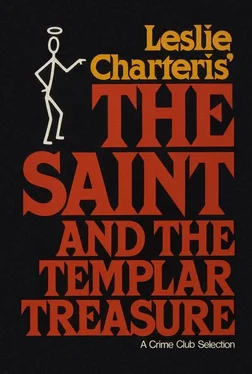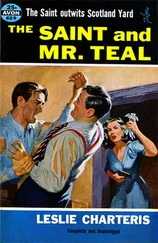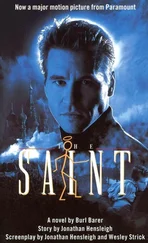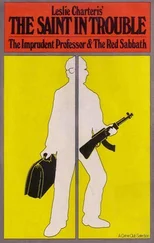Mimette’s face darkened as she remembered the events in the tower.
“Norbert is obsessed with the treasure and I think he’d try anything to find it, even dabbling in the occult. And not only to prove his scholarship. I’m sure he’d also be delighted to make some money out of it.”
“And Philippe?”
“Uncle Philippe will try anything if there is likely to be a profit at the end,” she returned cynically. “He’s taken a great interest in Norbert’s work. Sometimes I think that’s why he wants to buy the château, just so that he can pull it down brick by brick to see if the treasure really is here. Then he could build a wine factory, nice and modern, nice and functional, and nice and profitable.”
“What did you mean about your father saving Philippe’s life, and what was Yves’s reference to the war all about?”
Mimette seemed to be considering the implications of answering as she gazed at the liquid in her glass.
At last she shrugged and said resignedly: “What does it matter if you know? Philippe was in Paris during the war. He made a fortune on the black market.”
“Nothing so terrible in that,” said the Saint dispassionately. “I suppose he had to make a living somehow.”
“No, not in itself,” Mimette agreed. “But he was very friendly towards the Germans. People believed he was a collaborator and that that was why he was never arrested. He was more valuable giving the Germans information than he would have been in prison. There was a resistance group near Lille which Philippe had a connection with. I don’t know all the details, but apparently he ran a sideline in forged identity papers, travel permits, that sort of thing. One night he was due to meet a contact. He never turned up but the Germans did. The whole group was rounded up and most of them were shot.”
“So why is he still around? I thought most collaborators didn’t last long after the Allies arrived?”
“When Paris fell he came here, and Papa hid him for months. The word was put around that he had been killed in the street fighting before the city was liberated. It was easy to believe. People trusted my father, and anyway everything was in chaos. When things began to get back to normal and tempers had cooled, he returned to Paris. After all, the people he betrayed were dead, and there was no real proof against him. He used his money to open new businesses, and the richer he became, the more powerful he was, and the harder it was to challenge him.”
“I know the type, said the Saint dryly. Endow a couple of charities, support the right political party, and suddenly you’re a great guy and no one wants to remember.”
Mimette laughed shortly and without amusement.
“That’s good old Uncle Philippe. The big dealer.”
“If all you’ve said is true, why does your father put up with him?”
“My father is a very gentle man. Although Philippe is only his half-brother — they had the same father but different mothers — he has always felt protective towards him. He believes it is all a question of family loyalties. He is blind to what Philippe is trying to do.”
“And you are not?”
Mimette rose and placed her empty glass on the table. She glanced at the clock and then at the Saint.
“It is very late, and we start the harvest as soon as it is light,” she replied with a return to the businesslike briskness that had so irritated him that afternoon. “If you will excuse me, I am also very tired.”
He realised that nothing was to be gained by pressing her further and allowed his question to remain unanswered. He swallowed the last of his brandy and stood up.
“Until my car is repaired,” he said, “if there’s anything you’d like me to do—”
Mimette faced him inscrutably.
“Just keep your eyes open.”
At the door she turned.
“Could there be anything in supernatural explanations — in some destiny that forces some accidents to happen?”
“Such as?”
“After all,” she said, “we seem to have been sent our very own Knight Templar to help us.”
The Saint gave her a courtly bow.
“A vos ordres,” he said.
She laughed again, and left him with a cheerful “Dormez bien!”
The sudden change of mood might have perplexed him if he had not witnessed a succession of similar transformations during the day. As it was, he accepted it as further evidence of what he was already afraid of. That Mimette Florian could be very close to a breakdown, and that her collapse might bring down the whole mysterious fabric of Château Ingare.
The Saint had never been convinced of the proverbial benefits ascribed to early rising. The nature of his vocation frequently entailed going to bed late and getting up at an hour when most of the population are contemplating lunch. So far as he could tell, the habit had done him little harm. It had certainly helped to make him wealthy, and appeared to have had no adverse effect on either his health or his wisdom. Furthermore, it had never developed in him any latent enthusiasm for catching worms.
Mimette had said that they started the harvest shortly after dawn but had considerately omitted to invite him to be present. Possibly she felt that he would only get in the way. In any case, he was grateful. He decided on a compromise between his normal inclination and the regime of the château, and opened his eyes as the grandfather clock on the landing outside his bedroom chimed for the ninth time.
He had slept the sound sleep that is supposed to be the prerogative of the innocent, and felt confident of being able to tackle anything the inhabitants of Château Ingare might throw in his way. He had not stayed awake considering the implications of what Mimette had told him, being content to let the new day shed more light on the problems of the house. Nor did he allow them to worry him as he dressed but concerned himself solely with the selection of the day’s wardrobe.
He met Charles in the corridor outside his room, and the old man informed him that he had been just about to wake him.
“Clairvoyance is another of my gifts,” said the Saint breezily. “And where do I break my fast?”
“The dining-room, m’sieu,” Charles replied, and added that his hosts and fellow guests had already eaten. “Is there anything special you would like?”
“Could you manage ham and eggs?”
“Of course.”
Simon followed him down to the reception area. The double doors of the old hall were open and the Saint stopped and looked in. The muffled sounds of hammering reached him.
“A woodpecker must have got in,” he observed, and the servant allowed himself a half smile.
“I understand Professor Norbert is doing some restoration work in the chapel.”
“Sounds more as if he’s trying to dig his way out,” Simon commented as Charles ushered him into the dining-room.
One of the hardships of travelling in the country of haute cuisine is that the French have never discovered the delicious potential of real bacon or the proper art of frying eggs. However, the ham and eggs which he had ordered, cooked together in the inevitable little porcelain dish, would provide the solid sustenance which Simon Templar deemed an essential start to the day, in addition to a freshly baked croissant and some home-made jam. After disposing of them, he poured a second cup of coffee and picked up the copy of the newspaper that had been left beside his place.
He scanned the pages but found little of interest. The French Government was in danger of falling, which in those days was as regular as rain in April, and there was speculation about a general strike. These and a stepping up of the war in Indochina were allocated about half the space devoted to the fact that a lady in Toulouse had produced sextuplets. As he turned to an even more exhaustive coverage of a rumoured romance between a royal prince and a nude dancer at the Folies-Bergere, Charles entered to inform him that the mechanic from the local garage had arrived.
Читать дальше












